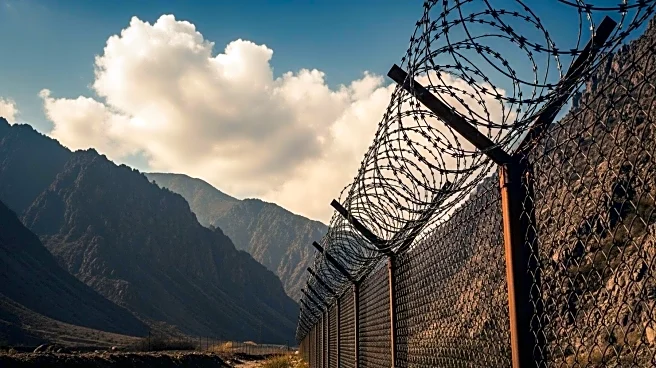What's Happening?
President Trump has expressed willingness to intervene in the ongoing conflict between Pakistan and Afghanistan, following days of deadly cross-border fighting. The clashes have resulted in significant casualties, with Pakistan reporting the deaths of 23 soldiers and injuries to 29 others, while Afghanistan claims 58 Pakistani soldiers were killed. The conflict escalated after accusations from Kabul that Pakistan conducted airstrikes inside Afghan territory. President Trump, en route to an international peace summit in Egypt, suggested he might address the issue upon his return, highlighting his self-proclaimed ability to resolve conflicts.
Why It's Important?
The potential involvement of President Trump in the Pakistan-Afghanistan conflict could have significant implications for U.S. foreign policy and regional stability. His intervention may alter diplomatic relations and influence the dynamics of the conflict. The situation underscores the complex geopolitical landscape in South Asia, where U.S. involvement could either mitigate or exacerbate tensions. The conflict also highlights the fragile security situation in the region, with implications for international peace efforts and the role of major powers in conflict resolution.
What's Next?
The upcoming peace summit in Egypt, co-chaired by President Trump, may serve as a platform for discussions on the Pakistan-Afghanistan conflict. The presence of Pakistani leaders at the summit could facilitate dialogue and potential resolutions. The international community will likely watch closely for any diplomatic moves or agreements that may emerge from the summit. President Trump's comments suggest a possible shift in U.S. engagement in South Asian conflicts, with potential diplomatic or military actions contingent on developments.
Beyond the Headlines
President Trump's approach to international conflicts often involves direct intervention and negotiation, reflecting his broader foreign policy strategy. His willingness to engage in the Pakistan-Afghanistan conflict may signal a proactive U.S. stance in regional disputes. The situation also raises questions about the effectiveness of unilateral interventions in complex geopolitical issues and the potential for long-term peace and stability in the region.









